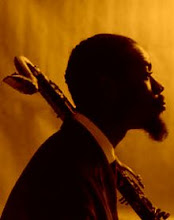When I think about Martin Luther King, rarely, if at all do I think of him in a jazz context. However, several years ago, when word of MLK's opening remarks at the 1964 Berlin Jazz Festival began to circulate, MLK and Jazz became top of mind for me and jazz "apprecianados" everywhere. Wow..it was truly amazing; speech transcripts suddenly became ubiquitous and upon review it was easy to see that the stirring 330 words were indeed written by the civil rights leader. No photos or recordings but there were/are zillions of search results on Google, postings of the transcript on social network pages, newspaper stories, eyewitness accounts etc., thanks to the speed and global reach of the internet. But, as we found out with news reports following the tragic shooting of Congresswoman Gabrielle Giffords, in cyberspace, access is no substitute for accuracy and the reports of MLK's appearance at Jazz Berlin '64 were alas, greatly exaggerated.
Thanks to some painstaking research by saxophonist David Demsey and drummer Bruce Jackson, under the auspices of William Patterson University, the true origin and nature of King's speech has been revealed, just in time for the 82nd anniversary of MLK's birth (Jan 15th). Read the full account of their discovery here. A full transcript of his 1964 Berlin Jazz Festival Address is below.
God has wrought many things out of oppression. He has endowed his creatures with the capacity to create—and from this capacity has flowed the sweet songs of sorrow and joy that have allowed man to cope with his environment and many different situations.
Jazz speaks for life. The Blues tell the story of life's difficulties, and if you think for a moment, you will realize that they take the hardest realities of life and put them into music, only to come out with some new hope or sense of triumph.This is triumphant music.
Modern jazz has continued in this tradition, singing the songs of a more complicated urban existence. When life itself offers no order and meaning, the musician creates an order and meaning from the sounds of the earth which flow through his instrument.
It is no wonder that so much of the search for identity among American Negroes was championed by Jazz musicians. Long before the modern essayists and scholars wrote of racial identity as a problem for a multiracial world, musicians were returning to their roots to affirm that which was stirring within their souls.
Much of the power of our Freedom Movement in the United States has come from this music. It has strengthened us with its sweet rhythms when courage began to fail. It has calmed us with its rich harmonies when spirits were down.
And now, Jazz is exported to the world. For in the particular struggle of the Negro in America there is something akin to the universal struggle of modern man. Everybody has the Blues. Everybody longs for meaning. Everybody needs to love and be loved. Everybody needs to clap hands and be happy. Everybody longs for faith. In music, especially this broad category called Jazz, there is a stepping stone towards all of these.




